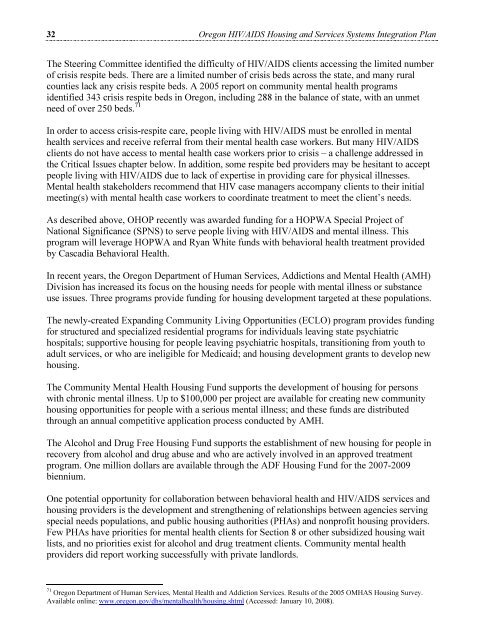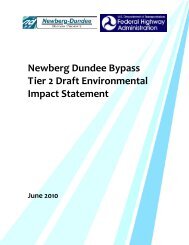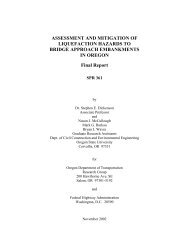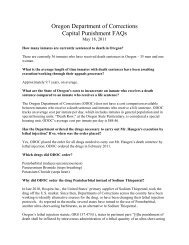Oregon Balance of State HIV/AIDS Housing & Services Systems ...
Oregon Balance of State HIV/AIDS Housing & Services Systems ...
Oregon Balance of State HIV/AIDS Housing & Services Systems ...
You also want an ePaper? Increase the reach of your titles
YUMPU automatically turns print PDFs into web optimized ePapers that Google loves.
32 <strong>Oregon</strong> <strong>HIV</strong>/<strong>AIDS</strong> <strong>Housing</strong> and <strong>Services</strong> <strong>Systems</strong> Integration Plan<br />
The Steering Committee identified the difficulty <strong>of</strong> <strong>HIV</strong>/<strong>AIDS</strong> clients accessing the limited number<br />
<strong>of</strong> crisis respite beds. There are a limited number <strong>of</strong> crisis beds across the state, and many rural<br />
counties lack any crisis respite beds. A 2005 report on community mental health programs<br />
identified 343 crisis respite beds in <strong>Oregon</strong>, including 288 in the balance <strong>of</strong> state, with an unmet<br />
need <strong>of</strong> over 250 beds. 71<br />
In order to access crisis-respite care, people living with <strong>HIV</strong>/<strong>AIDS</strong> must be enrolled in mental<br />
health services and receive referral from their mental health case workers. But many <strong>HIV</strong>/<strong>AIDS</strong><br />
clients do not have access to mental health case workers prior to crisis – a challenge addressed in<br />
the Critical Issues chapter below. In addition, some respite bed providers may be hesitant to accept<br />
people living with <strong>HIV</strong>/<strong>AIDS</strong> due to lack <strong>of</strong> expertise in providing care for physical illnesses.<br />
Mental health stakeholders recommend that <strong>HIV</strong> case managers accompany clients to their initial<br />
meeting(s) with mental health case workers to coordinate treatment to meet the client’s needs.<br />
As described above, OHOP recently was awarded funding for a HOPWA Special Project <strong>of</strong><br />
National Significance (SPNS) to serve people living with <strong>HIV</strong>/<strong>AIDS</strong> and mental illness. This<br />
program will leverage HOPWA and Ryan White funds with behavioral health treatment provided<br />
by Cascadia Behavioral Health.<br />
In recent years, the <strong>Oregon</strong> Department <strong>of</strong> Human <strong>Services</strong>, Addictions and Mental Health (AMH)<br />
Division has increased its focus on the housing needs for people with mental illness or substance<br />
use issues. Three programs provide funding for housing development targeted at these populations.<br />
The newly-created Expanding Community Living Opportunities (ECLO) program provides funding<br />
for structured and specialized residential programs for individuals leaving state psychiatric<br />
hospitals; supportive housing for people leaving psychiatric hospitals, transitioning from youth to<br />
adult services, or who are ineligible for Medicaid; and housing development grants to develop new<br />
housing.<br />
The Community Mental Health <strong>Housing</strong> Fund supports the development <strong>of</strong> housing for persons<br />
with chronic mental illness. Up to $100,000 per project are available for creating new community<br />
housing opportunities for people with a serious mental illness; and these funds are distributed<br />
through an annual competitive application process conducted by AMH.<br />
The Alcohol and Drug Free <strong>Housing</strong> Fund supports the establishment <strong>of</strong> new housing for people in<br />
recovery from alcohol and drug abuse and who are actively involved in an approved treatment<br />
program. One million dollars are available through the ADF <strong>Housing</strong> Fund for the 2007-2009<br />
biennium.<br />
One potential opportunity for collaboration between behavioral health and <strong>HIV</strong>/<strong>AIDS</strong> services and<br />
housing providers is the development and strengthening <strong>of</strong> relationships between agencies serving<br />
special needs populations, and public housing authorities (PHAs) and nonpr<strong>of</strong>it housing providers.<br />
Few PHAs have priorities for mental health clients for Section 8 or other subsidized housing wait<br />
lists, and no priorities exist for alcohol and drug treatment clients. Community mental health<br />
providers did report working successfully with private landlords.<br />
71 <strong>Oregon</strong> Department <strong>of</strong> Human <strong>Services</strong>, Mental Health and Addiction <strong>Services</strong>. Results <strong>of</strong> the 2005 OMHAS <strong>Housing</strong> Survey.<br />
Available online: www.oregon.gov/dhs/mentalhealth/housing.shtml (Accessed: January 10, 2008).

















